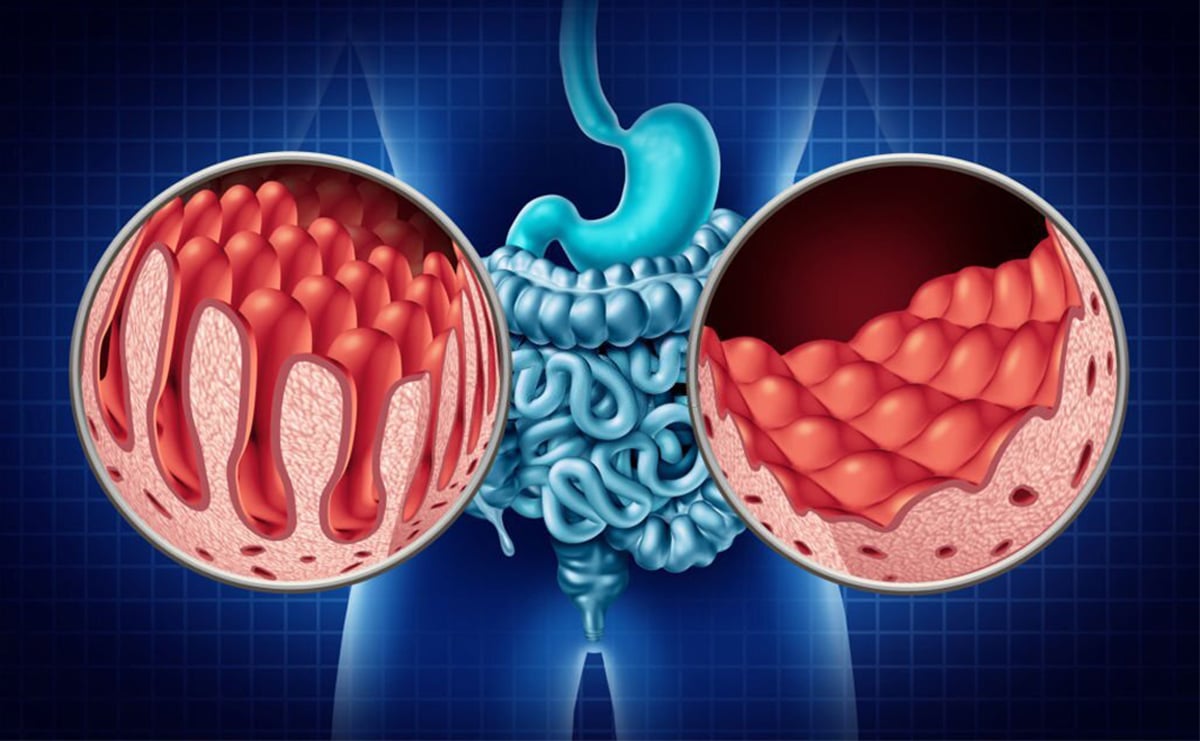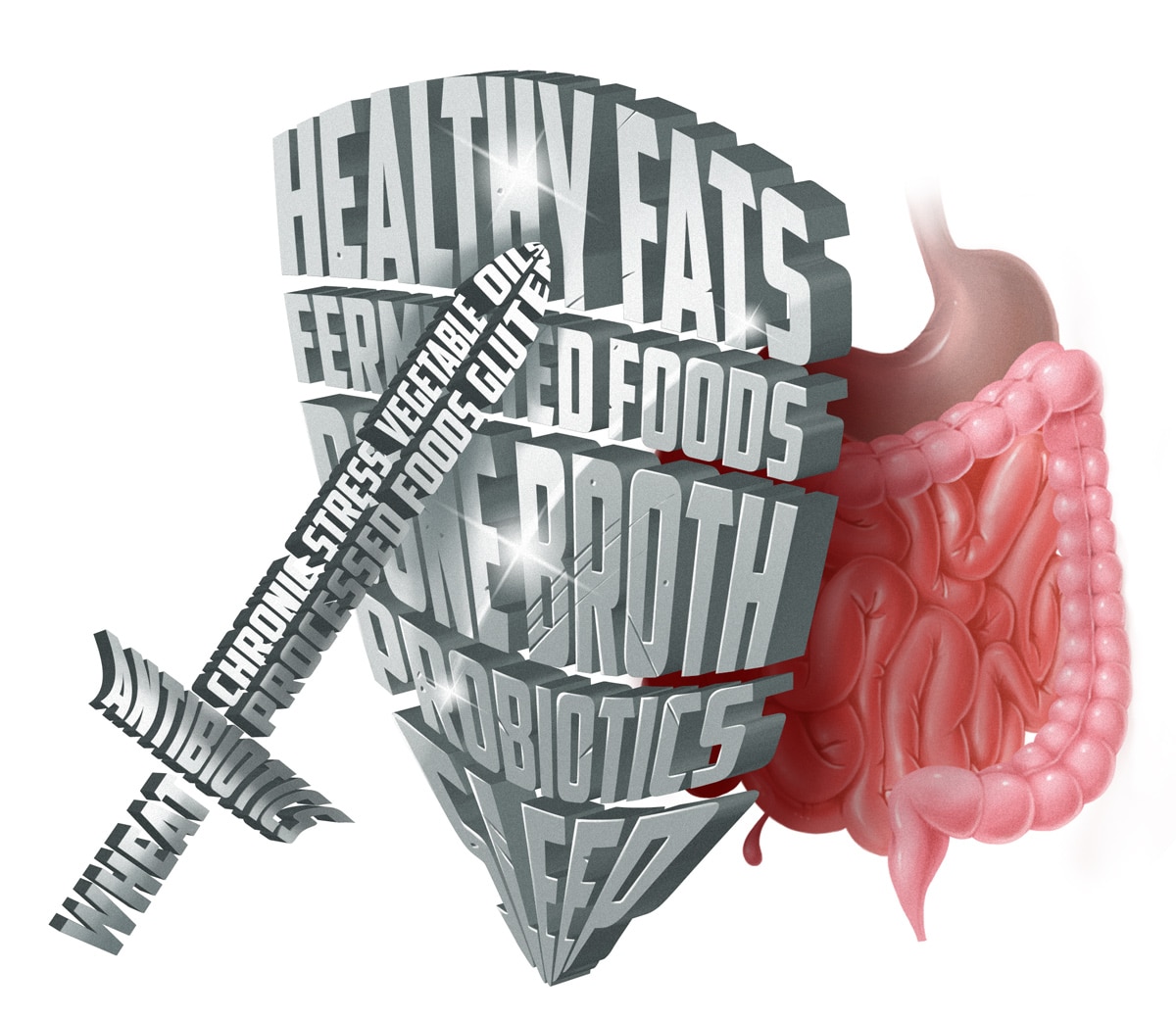
Have you ever had a strange health problem that kept showing up even when you thought you were doing everything right? Maybe you were sleeping 9 hours a night in a pitch-black room with the very best sleep hygiene ever recorded, but you were still exhausted. If you were eating Paleo at the time, an iron deficiency probably wouldn’t be on your radar at all – nobody eating red meat and egg yolks on the regular has any reason to worry about getting enough iron, right?
Wrong. Putting enough iron in your mouth doesn’t mean it’ll actually get into your body where you need it. Malabsorption is not an uncommon problem, and it can cause all kinds of strange nutrient deficiency problems even if you’re eating enough nutrients. Often, this shows up as inexplicable symptoms like fatigue, gas, bloating, or other problems with no obvious cause.
Malabsorption is particularly common in certain diseases like Crohn’s Disease or Celiac Disease, but it can also be caused by all kinds of other things, and sometimes it’s the only symptom. Here’s a look at the causes and potential symptoms, and what you can do about them.
What Is Malabsorption?
Malabsorption means that your body isn’t extracting something from your food properly – either one specific nutrient or a bunch of them. Malabsorption can affect macronutrients (protein, fat, and carbs) or micronutrients (vitamins and minerals) or both. And it has the kind of vague, annoying consequences that are notoriously complicated to pin down:
- Chronic gastrointestinal issues, bloating, constipation, gas, and other GI symptoms (from carbohydrate malabsorption)
- Inexplicable fatigue even if you’re sleeping plenty (from iron/B12/folate malabsorption)
- Bone problems and brittle bones (from calcium malabsorption)
- Inexplicable weight loss or inability to gain weight (from macronutrient malabsorption. If you’re trying to lose weight, you might think you want this problem. You do not want this problem.)
- Muscle cramping (from calcium and Vitamin D malabsorption)
The common factor in all of these is that they keep showing up even if you’re “doing everything right.” You think your nutrient intake is totally fine, because you’re getting plenty of nutrients in your food, but in reality those nutrients are just going right out the other end.
But Shouldn’t Paleo Take Care of That?
Well, yes and no. It depends on the reason for the malabsorption. Paleo is a gut-healing diet, which can address many of the potential causes of malabsorption, but it doesn’t automatically hit all of them. Here’s a list of just some potential causes of malabsorption, with the nutrients they typically affect.
Serious Diseases (Micronutrient and Macronutrient malabsorption)
- Celiac Disease (causes malabsorption of iron, vitamin B12, folic acid, calcium, and Vitamin D). Anemia and osteoporosis are both very common in Celiac patients and sometimes the only external signs.
- Inflammatory Bowel Disease/Crohn’s Disease and Ulcerative Colitis (causes malabsorption of protein, fat, carbohydrates, and several micronutrients, notably folic acid, iron, calcium, and Vitamins B12 and D). People with IBD can be “starving” even though plenty of food is going into their mouth.
- Parasite infection (causes malabsorption of carbohydrates, Vitamin B12, and some others). Sometimes the only sign of a parasite infection is a nutrient deficiency caused by malabsorption – they don’t always cause vomiting and diarrhea!
- Gallbladder issues and/or a removed gallbladder (causes fat malabsorption). You can read more about this here.
- Other serious diseases (various nutrients). For example, HIV, some types of cancer, and liver disease can all cause nutrient malabsorption.
Enzyme and Gut Flora Problems (Carbohydrate Malabsorption)
These problems typically cause gastrointestinal symptoms (e.g. cramps, diarrhea, gas, constipation, bloating, etc.) rather than outright nutrient deficiencies. Carbohydrate malabsorption is a very common reason for unexplained gastrointestinal symptoms.
- Lactase deficiency/lactose malabsorption (causes malabsorption of the milk sugar lactose).
- Gut flora overgrowth/SIBO (causes malabsorption of fiber and/or certain carbohydrates, called FODMAPs). Gut flora problems can cause problems absorbing and digesting one or more types of carbohydrates found in fruits and vegetables.
- Fructose malabsorption (causes malabsorption of fructose). This is different from gut flora problems because it’s caused by a problem in the intestinal wall, not by a problem in the flora themselves.
Other Causes
- Antacid drugs (cause malabsorption of calcium and Vitamin B12) – if you can’t break it down in your stomach, you can’t use it.
- Excessive alcohol (causes malabsorption of B vitamins). Drinking one glass of wine isn’t an issue, but alcoholics often have malabsorption problems.
Some causes of malabsorption can dramatically improve or even resolve with a strict Paleo diet. For example, Celiac patients who have malabsorption problems unsurprisingly tend to do much better on a gluten-free diet.

But in other cases, just eating a basic Paleo diet may not be enough to actually resolve the underlying issue. This can happen for two reasons:
- Paleo doesn’t remove all potential food intolerances or causes of malabsorption. For example, you might be eating Paleo, but you’re still eating a lot of fruit. If you have a fructose malabsorption problem, then Paleo won’t resolve it unless you also cut out the fruit. Paleo is also not a miracle cure for cancer or other deadly diseases that can cause malabsorption.
- Removing trigger foods doesn’t necessarily undo the damage they’ve already caused. If you get caught out in the rain and run for cover, you don’t magically become dry just because you aren’t actively being rained on any longer. It’s not always enough to stop “raining on” your gut with unhealthy foods; sometimes you have to actually give it a change of clothes and a towel-dry.
An example of this is what happens when people with Celiac Disease stop eating gluten. This study explains how even with a strict gluten-free diet, the long-term consequences of intestinal damage can keep causing problems. For example, some Celiac patients on a gluten-free diet have longer-term trouble with their gallbladder (which impairs their ability to absorb fat), or with their pancreas (responsible for production of insulin). Sometimes they still have bacterial overgrowth problems, which can cause other kinds of malabsorption.
Quitting gluten isn’t enough in this case – healing means more than just removing the problem.
Dealing with Malabsorption
So if just removing the triggers of malabsorption isn’t enough to heal, what is?
Step 1 is finding the problem. A doctor can run all kinds of diagnostics, from breath tests for potential SIBO or bacterial overgrowth to parasite diagnostics to tests for Celiac Disease. If you have an obvious problem, like a parasite infection, your doctor can also work with you to treat it.
Fixing the problem might mean just removing the trigger (e.g. cutting out lactose or fructose) and healing your gut. Digestive enzymes (for fat/protein malabsorption) probiotics (for gut/carbohydrate issues), and other gut-healing strategies can all help. Sources of nutrients that don’t rely on gut absorption (e.g. suntanning for Vitamin D instead of eating it) can be helpful for the symptoms.
Serious problems may require more intensive therapy - again, a doctor can prescribe things like injectable iron supplements (to bypass the gut and get iron levels back up while you heal), antibiotics (for bacterial overgrowth), or other treatments. It can’t be stressed enough that if you’re struggling with malabsorption caused by a serious disease, the solution is to see a doctor and discuss what you can do from a diet and supplement perspective to work on your particular issues. Some causes of malabsorption are very serious and potentially deadly diseases, and no diet is a magic wand.
Summing it Up
Malabsorption is hard to spot because it doesn’t seem logical. If you’re eating plenty of iron or calcium, how could you possibly have a deficiency? Unfortunately, it is possible, and it can cause a whole list of mystery symptoms. If just eating a nutrient-dense, gut-healing diet doesn’t take care of the problem, it might be time to talk to a doctor about possible malabsorption issues and figure out whether there’s anything you need to do to heal.





Leave a Reply